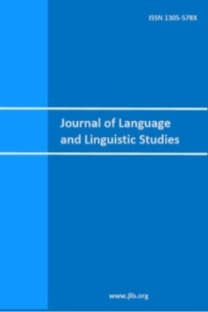ELT formation course program and pre-service teachers’ perceptions of self-disclosure
Teacher self-disclosure; pre-service teachers; language learning; perceptions; interaction
___
Connell, J. P., & Wellborn, J. G. (1991). Competence, autonomy and relatedness: a motivational analysis of self-system processes. In M. R. Gunnar & L. A. Sroufe (Eds.), Minnesota symposium on child psychology, 22 (pp. 43–77). Hillsdale: L. Erlbaum Associates.Çakmak, F. & Arap, B. (2013). Teachers’ perceptions of the appropriateness of teacher self-disclosure: A case study from Turkey. Journal of Teacher Education and Educators 2(2), 275-288.
Farani, S. T. & Fatemi, A. H. (2014). The impact of teacher’s self-disclosure on students’ attitude towards language learning in a foreign language context. Theory and Practice in Language Studies, 4(11), 2415-2422. DOI:10.4304/tpls.4.11.2415-2422
Goldstein, G. S., & Benassi, V. A. (1994). The relation between teacher self-disclosure and student classroom participation. Teaching of Psychology, 21(4), 212-217. DOI:10.1207/s15328023top2104_2
Jourard, S. M. (1971) Self-disclosure: The experimental investigation of the transparent self. New York: Wiley.
Nussbaum, J. F., & Scott, M. D. (1979). Instructor communication behaviors and their relationship to classroom learning. In D. Nimmo (Ed.), Communication Yearbook 3 (pp. 561-583). New Brunswick, NJ: Transaction Books.
Pianta, R. C. (1992). Beyond the parent: The role of other adults in children's lives. San Francisco, CA: Jossey-Bass.
Pishghadam, R. & Askarzadeh Torghabeh, R. (2009). The impacts of teacher self-disclosure on the speaking ability of EFL learners. Iranian EFL journal, 3, 37- 46.
Rahimi, A. & Bigdeli, R. A. (2016). Iranian EFL teachers' perceptions of teacher self-disclosure. Iranian Journal of Language Teaching Research 4(1), 83-96.
Rogers, C. (1969). Freedom to learn: A view of what education might become. Columbus, Ohio: Charles E. Merrill Publishing Company.
Sorensen, G. (1989). The relationships among teachers’ self-disclosive statements, students’ perceptions, and affective learning. Communication Education, 38, 259-276. DOI: 10.1080/03634528909378762
Vogel, D. L. & Wester, S. R. (2003). To seek help or not to seek help: the risks of self-disclosure. Journal of Counseling Psychology, 50(3), 351-361. DOI: 10.1037/0022-0167.50.3.351
Williams, M. & Burden, R. L. (1997). Psychology for language teachers: a social constructivist approach. Cambridge: Cambridge University Press.
Zhang, S., Shi, Q., Tonelson, S. & Robinson, J. (2009). Pre-service and in-service teachers’ perceptions of appropriateness of teacher self-disclosure. Teaching and Teacher Education, 29, 1117-1124.
- ISSN: 1305-578X
- Yayın Aralığı: Yılda 4 Sayı
- Yayıncı: Hacettepe Üniversitesi
Evaluating the effect of writing instructions on students' writing skills
Validity and reliability study of the attitude scale towards second foreign language learning
Şaban ÇETİN, Yusuf BUDAK, Filiz ÇETİN, A. Selcen ARSLANGİLAY
Identification of translation procedures for culture specific items in a short story
Review of studies focused on bilingualism
In search of developing practical knowledge in pre-service EFL teachers: A proposed model
Situated learning in translator and interpreter training: Model United Nations simulations
Gökçen HASTÜRKOĞLUGOKCEN.HASTURKOGLU@ATİLİM.EDU.TR
Causality related to coreferential and reciprocal structures in Ewe
Phillips Kofi Atsu LARNYO, Nathaniel GLOVER-MENİ
The relationship between intercultural sensitivity and English language achievement
